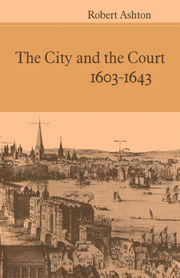Book contents
- Frontmatter
- Contents
- List of tables
- Preface and acknowledgements
- Note on dating, spelling and abbreviations
- Introduction
- 1 Institutions and oligarchy I: the municipal and business élites
- 2 Institutions and oligarchy II: gilds and companies
- 3 Big business and politics under James I
- 4 Big business and politics under Charles I
- 5 The crown and the municipality: local issues
- 6 The municipality and national issues
- 7 Conclusion
- Sources and bibliography
- Index
4 - Big business and politics under Charles I
Published online by Cambridge University Press: 07 October 2011
- Frontmatter
- Contents
- List of tables
- Preface and acknowledgements
- Note on dating, spelling and abbreviations
- Introduction
- 1 Institutions and oligarchy I: the municipal and business élites
- 2 Institutions and oligarchy II: gilds and companies
- 3 Big business and politics under James I
- 4 Big business and politics under Charles I
- 5 The crown and the municipality: local issues
- 6 The municipality and national issues
- 7 Conclusion
- Sources and bibliography
- Index
Summary
Just as the Statute of Monopolies may be said to mark an important stage in the differentiation between the type of individual monopolist who had hitherto loomed so large upon the domestic concessionary scene and the privileged corporate bodies in overseas trade, so did the events of the early parliaments of the reign of Charles I succeed in bringing to the boil the hardly latent antagonism which prevailed between privileged export–import groups and the syndicates of business concessionaires who farmed the royal customs. It was largely the almost indiscriminate hostility of the Commons to every sort of concessionaire before 1624 which had helped to create the illusion that there was some common ground between the chartered companies and domestic concessionaires like the monopolists and customs farmers, if only on the grounds that they all had incurred the hostility of the Commons, and had indeed on occasions been lumped together as part of a metropolitan plot to undermine the outports. In the early parliaments of Charles I's reign this illusory identity of mutually incompatible interests disappeared for ever. By the opening of the period of non-parliamentary rule in 1629 not only had the traditional hostility of the Commons to the chartered companies burnt itself out, but the course of the events of the first four years of the reign had produced an hitherto unprecedented identity of interest between the opposition in the Commons and the chartered companies.
- Type
- Chapter
- Information
- The City and the Court 1603-1643 , pp. 121 - 156Publisher: Cambridge University PressPrint publication year: 1979

